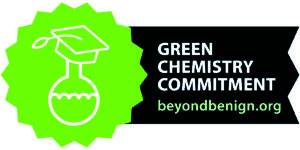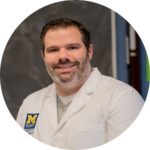
- This event has passed.
So you think you want to teach Green Chemistry
May 14, 2020 @ 12:00 pm - 1:00 pm
![]()
Building off our Transforming Chemistry Education: Models for Transitioning to Green Chemistry Education in Higher Education webinar Andy Dicks, David Laviska & Nick Kingsley will share tips & tricks for bringing Green Chemistry to their departments and beyond. Join the discussion by bringing your questions, or your advice based on your experiences. This discussion will cover approaches to transforming chemistry education as well as develop, expand, and strengthen Green Chemistry connections within the Green Chemistry education community. Register now to join the discussion!
This webinar is co-hosted with Green Chemistry Commitment Signers

Featured Speakers:

Andrew Dicks, Professor, Teaching Stream, University of Toronto
Andrew (Andy) Dicks joined the University of Toronto Chemistry Department in 1997, after undergraduate and graduate studies in the United Kingdom at the University of Wales (Swansea) and Durham University respectively. He was hired as part of the university teaching-stream faculty in 2001. He has research interests in undergraduate laboratory instruction that involve designing novel and stimulating experiments, particularly those that showcase green chemistry principles. Following promotion in 2006, he became Associate Chair of Undergraduate Studies and developed an ongoing interest in improving the student experience in his department. He has edited three books as resources for teaching green chemistry (“Green Organic Chemistry in Lecture and Laboratory” and “Problem-Solving Exercises in Green and Sustainable Chemistry” (both published by CRC Press) and “Integrating Green and Sustainable Chemistry Principles into Education”, published by Elsevier). In 2014 he was co-chair of the 23rd IUPAC International Conference on Chemistry Education which was held in Toronto and became a Fellow of the Royal Society of Chemistry (U.K.) in 2018.

Nick Kingsley, Associate Professor, University of Michigan – Flint
Dr. Kingsley is an Associate Professor of Chemistry at the University of Michigan-Flint. In his 10 years at UM-Flint he has taught 15 different lecture and laboratory courses including Chemistry for Pre-Nursing, General Chemistry I and II, P-Chem based Inorganic Chemistry, Quantum Mechanics, Chemical Applications of Group Theory and Green Chemistry. In the Fall of 2018 UM-Flint offered a new Bachelor’s of Science Degree in Green Chemistry and began widespread implementation of Green Chemistry principles across the curriculum. His research interests are in the area of Group 13 chemistry, specifically the development of aluminum catalysts as earth abundant replacements to precious metal catalysts. He has mentored over 18 students in his research lab who went on to graduate or professional school. He has interests in Green Chemistry education across the curriculum and increasing awareness of Green Chemistry to the broader community. Specific interests lie in embedding Systems Thinking and the United Nations Sustainable Development Goals across the chemistry curriculum to help address global challenges.

David Laviska, Assistant Professor, Seton Hall
After spending the first decade of his professional life working as an analytical chemist with the U.S. EPA, David returned to graduate school at Rutgers University and studied organometallic chemistry and catalysis with Alan S. Goldman. After graduating in 2013, he started his academic career by teaching in full-time visiting positions at several excellent institutions, and then joined Seton Hall in 2017. Dr. Laviska currently teaches General Chemistry and works primarily with first-year students to build a solid foundation for their future studies in the STEM disciplines. As a committed advocate for diversity in the sciences, he works to ensure that students from underrepresented groups are supported and made aware of institutional resources that will help them succeed. As a first-generation college graduate and scientist, he is also closely affiliated with “Gen-1” at Seton Hall – an initiative designed to encourage and support first generation students in all disciplines. Dr. Laviska’s research interests include several applications utilizing late transition metal complexes: hetero- and homogeneous catalysis, synthesis of new materials with unique optical properties, and small molecule activation. In addition, as a member of the Center for Applied Catalysis and Green Chemistry at Seton Hall, he places high importance on the concepts of sustainability and environmental stewardship. Accordingly, the principles of green chemistry are applied across all projects in his laboratory. Several of his enthusiastic undergraduate researchers are working on developing and piloting green(er) experimental methods for both undergraduate course curricula and applied research.
